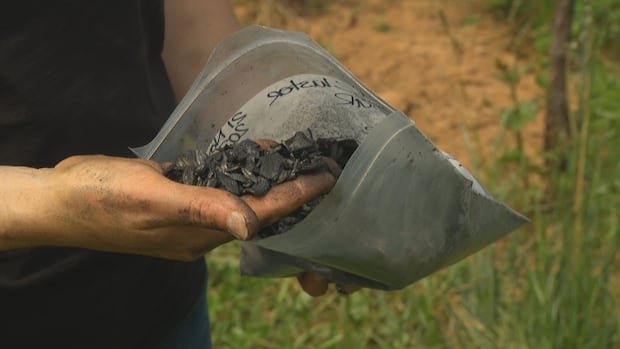In a picturesque field in the Annapolis Valley, a row of grapevines is surrounded by charred wood fragments scattered across the soil. These unassuming remnants play a crucial role as biochar, a substance that holds promise for enhancing soil health and carbon storage in the long term.
Vicky Lévesque, a research scientist with Agriculture and Agri-Food Canada in Kentville, emphasizes the potential of biochar in sequestering carbon in the soil instead of releasing it into the atmosphere. This initiative is part of ongoing projects in Nova Scotia where scientists and businesses are delving into the utilization and production of biochar to benefit both agriculture and combat climate change.
Biochar, created through a process called pyrolysis that involves heating organic materials like wood, crop waste, and manure at high temperatures without oxygen, is being tested by Lévesque on grapevines at various sites in the Valley. The research aims to assess its impact on carbon sequestration, soil biodiversity, plant growth, and nutrient retention over a four-year period.
The porous structure of biochar provides a habitat for beneficial microorganisms and offers exceptional water retention capabilities, up to 27 grams per gram of biochar. Additionally, biochar aids in aerating the soil, facilitating root penetration and reducing nitrogen loss caused by the freeze-thaw cycle in Atlantic Canada.
Sonil Nanda, an assistant professor at Dalhousie University, highlights the significance of biochar in advancing Canada’s climate change objectives by tapping into agricultural and forestry residues to produce this valuable material. However, challenges such as cost and limited availability of biochar hinder widespread adoption in the region.
To address these issues, a Halifax-based company is exploring ways to produce biochar from residual wood at sawmills, which would otherwise be disposed of unsustainably. By converting this waste material into biochar using advanced technology, the company aims to promote environmental sustainability and create a market for biochar products locally.
Furthermore, biochar is gaining traction as a solution to managing dead wood and vegetation resulting from climate-related events. Companies like BioBurn Pros are innovating portable burners to convert waste wood into biochar, offering a valuable resource that can be utilized in various applications, including disaster preparedness and soil enrichment.
The story of Rick Ketcheson, a Nova Scotian utilizing biochar on his property, exemplifies the practical benefits of integrating biochar into sustainable agriculture practices. With a focus on enhancing soil health and plant growth, Ketcheson’s experience underscores the potential of biochar in enabling communities to adopt eco-friendly solutions for soil enhancement and carbon sequestration.
In conclusion, the growing interest in biochar as a sustainable soil amendment signifies a positive shift towards embracing innovative solutions for environmental challenges. Through collaborative efforts between researchers, businesses, and individuals, biochar could play a pivotal role in promoting soil health, carbon sequestration, and climate resilience in Nova Scotia and beyond.

